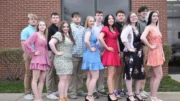NEW YORK (AP) — Mark Zuckerberg helped create the modern world by connecting nearly a quarter of its citizens to Facebook and giving them a platform to share, well, everything — baby pictures and Pepe memes, social updates and abusive bullying, helpful how-to videos and live-streamed violence.
Now he wants to remake it, too, in a way that counters isolationism, promotes global connections and addresses social ills — while also cementing Facebook’s central role as a builder of online “community” for its nearly 2 billion users.
The Facebook founder laid out his thoughts on Thursday in a sweeping 5,800-word manifesto that hews closer to utopian social guide than business plan. Are we, he asked in the document, “building the world we all want?”
In a phone interview with The Associated Press, Zuckerberg stressed that he wasn’t motivated by the recent U.S. election or any other particular event. Rather, he said, it’s the growing sentiment in many parts of the world that “connecting the world” — the founding idea behind Facebook — is no longer a good thing.
“Across the world there are people left behind by globalization, and movements for withdrawing from global connection,” Zuckerberg, who founded Facebook in a Harvard dorm room in 2004, wrote on Thursday. So it falls to his company to “develop the social infrastructure to give people the power to build a global community that works for all of us.”
CONNECTING IN FACEBOOK’S INTEREST
Zuckerberg, 32, told the AP that he still strongly believes that more connectedness is the right direction for the world. But, he added, it’s “not enough if it’s good for some people but it’s doesn’t work for other people. We really have to bring everyone along.”
It’s hardly a surprise that Zuckerberg wants to find ways to bring more people together, especially on Facebook. After all, getting more people to come together on the social network more frequently would give Facebook more opportunities to sell the ads that generate most of its revenue, which totaled $27 billion last year. And bringing in more money probably would boost Facebook’s stock price to make Zuckerberg — already worth an estimated $56 billion — even richer.
And while the idea of unifying the world is laudable, some critics — backed by various studies — contend that Facebook makes some people feel lonelier and more isolated as they scroll through the mostly ebullient posts and photos shared on the social network. Facebook’s famous “like” button also makes it easy to engage in a form of “one-click” communication that can displace meaningful dialogue.
Facebook also has been lambasted as a polarizing force by circulating posts espousing similar viewpoints and interests among like-minded people, creating an “echo chamber” that can harden opinions and widen political and cultural chasms.
COMMUNITY SUPPORT
Today, most of Facebook’s 1.86 billion members — about 85 percent — live outside of the U.S. and Canada. The Menlo Park, California-based company has offices everywhere from Amsterdam to Jakarta, Indonesia, to Tel Aviv, Israel. (It is banned in China, the world’s most populous country, though some people get around the ban.) Naturally, Zuckerberg takes a global view of Facebook and sees potential that goes beyond borders, cities and nations.
Equally naturally, he sees the social network stepping up as more traditional cultural ties fray. People already use Facebook to connect with strangers who have the same rare disease, to post political diatribes, to share news links (and sometimes fake news links ). Facebook has also pushed its users to register to vote, to donate to causes, to mark themselves safe after natural disasters, and to “go live .” For many, it’s become a utility. Some 1.23 billion people use it daily.
“Our next focus will be developing the social infrastructure for community — for supporting us, for keeping us safe, for informing us, for civic engagement, and for inclusion of all,” he wrote.
LONG VIEW
Zuckerberg has gotten Facebook to this position of global dominance — one that Myspace and Twitter, for instance, never even approached — partly thanks to his audacious, long-term view of the company and its place in the world.
Last fall, Zuckerberg and his wife, the doctor Priscilla Chan, unveiled the Chan Zuckerberg Initiative , a long-term effort aimed at eradicating all disease by the end of this century. Then, as now, Zuckerberg preferred to look far down the road to the potential of scientific and technological innovations that have not been perfected, or even invented yet.
That includes artificial intelligence, which in this case means software that’s capable of “thinking” enough like humans to start making the sorts of judgments that Facebook sometimes bobbles. Last September, for instance, the service briefly barred the famous Vietnam War-era photograph dubbed “Napalm Girl” because it featured a nude child, and only reversed its decision after users — including the prime minister of Norway — protested.
AI systems could also comb through the vast amount of material users post on Facebook to detect everything from bullying to the early signs of suicidal thinking to extremist recruiting. AI, Zuckerberg wrote, could “understand more quickly and accurately what is happening across our community.”
Speaking to the AP, Zuckerberg said he understands that we might not “solve all the issues that we want” in the short term.
“One of my favorite quotes is this Bill Gates quote, that ‘people overestimate what they can get done in two years and underestimate what they can get done in 10 years.’ And that’s an important mindset that I hope more people take today,” he said.








































